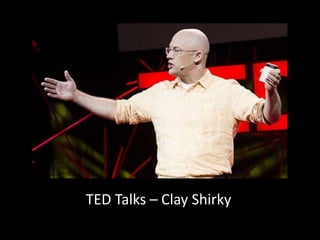
TED Talks - Clay Shirky (Amanda Rzucidlo)
- 1. TED Talks – Clay Shirky
- 2. Clay Shirky is an American writer, consultant and teacher on the social and economic effects of Internet technologies. In his words, his job is to “watch people argue”
- 3. Shirky’s June 2012 speech focused on the power of distributed yet coordinated open source programming efforts, and how these principles could be applied to allow citizens access to the legislative and budgetary aspects of governing.
- 4. Shirky contends that “More media always means more arguing” – but tools available today allow people to make changes collectively and freely to bills or budgets
- 5. Shirky showed the power of Internet to persuade governments by detailing 9-year old Martha Payne’s blog about her school lunches, which included ratings on nutritional value and numbers of hairs found
- 6. The local council took offense to this, and her head teacher told her to stop taking pictures. The outcry was so massive and immediate that the council reversed its stance the same day.
- 7. The speech continued to draw parallels to how Linus Torvalds, The Invisible College, and others used and experimented with new media to further their goals, rather than continuing with what had been done before and by others.
- 8. He even drew lines to the governmental aspects early on in the speech, calling the commercial ways of programming feudalism, with many workers supporting one owner.
- 9. Shirky used TED Commandment Two to great effect; his speech even referenced how OTHER people wondered why this had not been tried before, with the answer detailing just how new and unknown an idea this was.
- 10. I would rate Shirky as a 4.5/5. His intensity overrode any dynamic and energetic presence he had on stage, but the quiet as he spoke was tangible with how deeply the audience was immersed.
- 11. Shirky’s slides were topical, drew on previous examples and expounded upon them to do an excellent job of pressing his point, with generally very little text as recommended by Garr Reynolds and Nancy Duarte.
- 12. The slides on organization and org-charts in particular exemplified extraordinarily well how everything was interconnected, raising the chaos and difficulty in management.
- 13. Shirky’s knowledge base is astonishing. There was barely a creaking chair to be heard as the audience drank in his words. Humor was sparing, but he didn’t need it to keep their attention. The depth of his understanding and passion for the content of his speech was more than enough.
- 14. I preferred listening to Shirky’s speeches over Sir Robinson’s, the numerous laughter breaks in Sir Robinson’s speeches made it difficult to follow from an academic standpoint, when trying to listen for information.
- 15. Sir Robinson’s speeches better displayed his humanity and Commandment 6, and he told his points through stories rather than through discrete facts. Shirky’s speech was more of a report rather than a collection of stories leading to a point.
- 16. In person, I believe I’d have more difficulty deciding, but both speakers bring strong passion to topics that are immediately relevant and vital to our growing society, and that intensity is what keeps the audience riveted.
- 17. Shirky’s speeches have inspired me to speak with such presence, and to know a subject so well and so passionately that I can string it all together so clearly.